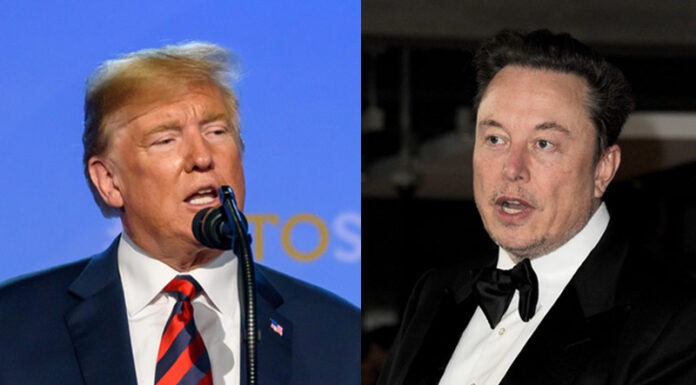The public dispute between President Donald Trump and tech entrepreneur Elon Musk intensified on June 5, 2025, as both figures exchanged personal criticisms over social media, potentially affecting vital government functions and federal contracts worth billions.
The escalation occurred when Musk responded to Trump’s remarks in the Oval Office by asserting on X that without his support, Trump would have lost the 2024 election. Musk contended that without his backing, Democrats would control the House, and Republicans would have only a narrow 51-49 majority in the Senate, accusing Trump of ingratitude.
The conflict began when Trump expressed disappointment to reporters in the Oval Office on June 5 over Musk’s criticism of the “One Big Beautiful Bill Act,” which had recently been passed by the House of Representatives. Trump alleged that Musk’s disapproval was due to the removal of electric vehicle incentives, which would have benefited Musk’s Tesla company.
On Truth Social, Trump stated that Musk was “wearing thin” and claimed he had asked Musk to leave the administration. He mentioned revoking Musk’s EV mandate, saying it was a decision made months ago. Trump’s most provocative comment suggested that terminating Musk’s governmental subsidies and contracts would be a straightforward way to save “Billions and Billions of Dollars” in the budget.
Musk’s reaction was immediate. Following Trump’s suggestion to end his government contracts, SpaceX CEO Elon Musk announced on X that his company would begin decommissioning its Dragon spacecraft. This move caused concern in the space industry, as Dragon is the sole American vehicle capable of ferrying astronauts to the International Space Station.
Decommissioning could leave NASA without its primary access to the $100 billion orbiting lab, forcing it to rely on Russian Soyuz spacecraft. Approximately $22 billion of SpaceX’s government contracts might be jeopardized, though the actual classified amount could be higher. Since 2008, SpaceX has received over $20 billion in contracts from NASA, the Air Force, and other agencies.
NASA Press Secretary Bethany Stevens responded to Musk’s threat, indicating on X that the agency would continue working towards the president’s space objectives with industry partners, without explicitly mentioning SpaceX.
The dispute escalated when Musk attributed a recession in late 2025 to Trump’s tariffs. In response to a post about Trump’s potential impeachment and replacement by J.D. Vance, Musk simply wrote, “Yes.” Musk also made allegations regarding Trump’s ties to Jeffrey Epstein files, which the White House condemned.
Later on June 5, Musk appeared to retract his most severe threat. After an X user with the handle @Fab25june suggested both parties “cool off and take a step back for a couple days,” Musk replied, “Good advice. Ok, we won’t decommission Dragon.” This step back relieved NASA and space industry officials concerned about potential disruptions.
The conflict centers on Trump’s significant tax and spending bill, which Musk criticized as a “disgusting abomination” that would increase the federal deficit by $2.4 trillion. On June 3, Musk called the bill fiscally irresponsible, energizing Republican deficit hawks in the Senate.
Several Republican legislators have expressed support for Musk’s fiscal concerns. Representative Thomas Massie of Kentucky, one of only three House Republicans opposing the bill, backed Musk’s stance. Senator Rand Paul of Kentucky agreed with Musk’s assessment, highlighting the waste of government spending. Senator Mike Lee of Utah urged the Senate to improve the bill, while Senator John Kennedy of Louisiana supported Musk’s concerns about national debt.
House Speaker Mike Johnson defended the legislation, dismissing Musk’s criticism. Johnson, who spoke with Musk for more than 20 minutes, described the bill as a historic tax cut and a major investment in border security, confident that it would benefit Americans before the midterm elections.
The public nature of the dispute has sparked concerns about its impact on Republican unity and the party’s prospects in the 2026 midterm elections. Musk, who contributed nearly $300 million to support Trump and other Republicans in 2024, has threatened to back primary challenges against those who supported the spending bill.
The feud’s effects were evident in financial markets, with Tesla shares dropping 14.3 percent on June 5, erasing about $150 billion in market value. The dispute has complicated efforts to pass the tax-cut bill in the Senate, where Republicans hold a slim majority.
This confrontation marks the first significant rift between Trump and a top adviser since the beginning of his second term. Tensions had been predicted due to the egos and social media presence of both men. Musk’s recent departure from his government role as head of the Department of Government Efficiency had already strained the relationship.
As the Senate works towards a July 4 deadline to pass the bill, the stability of the apparent truce between Trump and Musk remains uncertain. The conflict has underscored the influence of private contractors in government operations and raised questions about concentrating critical infrastructure in a single company’s hands. With the International Space Station’s retirement planned for 2030, the temporary resolution may only delay larger questions about America’s space program and its reliance on private industry partnerships.










